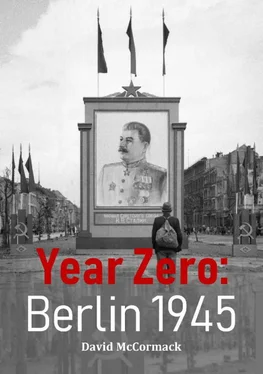During the first eight months of the Allied occupation, there was hunger amongst the population, but no famine. There were incidents of diseases such as typhoid fever, typhus and diphtheria, but not on an endemic scale. Statistics compiled by the British authorities provided valuable information regarding disease, suicide, crime and employment rates. However, first hand observations of the reality of life in post-war Berlin were more valuable still. Brett-Smith’s recollections say far more than bare statistics ever can. In his memoir, one particular passage vividly encapsulates the daily struggle faced by ordinary Berliners:
I see in my mind an old woman grubbing among the swill-tubs near a soldiers’ mess, until warned off, for this food is for the pigs; a vamp collapsing in a night-club from drinking two glasses of wine on a stomach that had been empty for two days from necessity, not from folly: a free fight among half a dozen citizens, men and women of varying age and children too, which started after four potatoes had rolled off a cornering British Army three-cornered. Two old men, fag end collectors, knocking heads as they both dive for a cigarette stump thrown from a passing Jeep. Corpses of refugees in cattle trucks at the Lehrter Station – had they died from starvation or from cold? These instances could be multiplied.
The hunger experienced by the population led in some extreme circumstances to serious crime, including murder. Between May and December 1945, between fifty and sixty murders were committed in Berlin every month. Most of the murders had robbery as their prime motive. Indeed, there had been a spate of armed robberies on the S-Bahn system by multinational gangs. The arming of the German police in early 1946 led to a substantial reduction in the murder rate, though not in other serious crimes. Organised and opportunistic vehicle theft remained a serious issue for the occupying authorities as Brett-Smith recalled:
It was courting disaster to leave a Jeep parked in the street without having immobilised it. Sometimes even that precaution did not prevent thieves from towing it away or removing all four tyres and the spare, and there were even some who, having padlocked their steering-wheel with a grim satisfaction an hour or so earlier, laughed on the other side of their faces when they returned to find steering-column and padlock arranged on the kerb, but no sign of a car.
As winter approached, coal thefts rose dramatically. Until conditions in the city improved markedly, the needy, the desperate, the opportunists and the unscrupulous would continue their illegal activities.
Chapter Twelve
Corruption in Low Places
Black market trading and prostitution proliferated across Berlin. To some extent, the American and Soviet occupying forces were responsible for the growth of the black market as they had allowed barter-shops to operate freely. This growing trade went some way to satisfying not just the needs of the population, but the occupying troops themselves. For the average soldier serving with the occupying forces, Berlin was an opportunity not to be missed. Like many others, American G.I. Peter Wyden profited from the burgeoning black market. However, unlike many of his colleagues working on a German language newspaper for the military administration, he felt uneasy about exploiting others for profit:
My worst discomfort was ethical. I didn’t like what the occupation was doing to me and my colleagues. We were becoming corrupted and we were liking it. Quite a few were becoming rich – I mean truly wealthy. I knew no one who wasn’t trading in the black market. American PX cigarettes (rationed but generously so) were the preferred medium of exchange. A few smokes paid for anything, including women, some of them respectable. Prices were quoted as on a stock exchange for our full inventory: GI shirts and socks, even Zagnut candy bars issued by the PX, although they seemed to consist of bone glue. Army friends stationed outside Berlin were jealous of us because they couldn’t share the action. They sent us merchandise for sale on a commission basis. Anything went for preposterous prices in Berlin; among the items delivered to my office for immediate clearance were a set of used dentures and an aerial camera freshly dismounted from a Luftwaffe bomber.
Wyden was a small time player on the black market scene. Like many others, he simply wanted to get something out of a posting he had never asked for in the first place. Like many others, he was able to rationalise what he was doing, and by doing so set any qualms he had aside.
For some of those posted to Berlin, the black market was an opportunity to experience the thrill of illicit trading. In his unpublished memoir, R.A.F. radio operator John (Jack) Hanwell recounted his own experience of the Berlin black market:
At one end of the Kurfurstendamm was Berlin’s main black market area. A pack of cigarettes or a tin of corned beef could easily be bartered for jewellery and other valuables. By the early evening it was heaving with people… Through the black market, I obtained a Walther pistol with six or seven rounds in the magazine, some opal earrings with a matching necklace, a couple of Leica cameras and some porcelain crockery…
The experience of this young wireless operator is fairly typical. As such, he cannot be compared to the legendary (and probably mythical) Lance Corporal who was said to have been the proud owner of whole apartment blocks in the eastern part of the city. Whilst there were undoubtedly some very dubious activities going on, most trading on the black market was innocent enough. Soldiers are known for their love of souvenirs. There was a particularly brisk trade in wrist-watches between American and Soviet troops. Colonel Frank Howley (American sector commandant) later explained the background to this trade:
On the Russian G.I’s level, the immediate goal was a watch. Russians love watches for a number of reasons. They have always been associated in the Muscovite mind with affluence and an established, even exalted, position in life. Peasants never owned watches! A wrist-watch – well! Watches soon became a universal commodity because troops had no confidence in the Russian currency. Also, a soldier could send a watch home and his wife could barter it for a cow. Even our G.I’s realised the fortune, in Russian eyes, represented by a watch and started to sell their own watches, converting the money into American dollars, although the men were forbidden to enter these markets… A Mickey Mouse watch was worth more than a jewel-studded trinket from Cartier.
Such was the extent of trade with the Soviet occupying troops, that the authorities tended to turn a blind eye. Although, there were occasional high profile raids on established black market areas in the Tiergarten, Alexander-Platz, Potsdamer-Platz, Friedrichstrasse and the Kurfurstendamm.
In October 1945, the ban on fraternisation with the German population in Berlin was lifted. Predictably, there was an explosion in prostitution with approximately 500,000 women working the streets and clubs by the end of the year. Considering that many of the occupations available to women in the immediate post-war period involved the fetishisation of their bodies in the seedy clubs which proliferated, it is not surprising that many took the next logical step by turning to prostitution. Some dressed their activities in an aura of romance as they secretly hoped that they would be whisked away by an American or British soldier who wanted to marry them. One married British Private later recalled his feelings over an affair with an eighteen year old German girl:
I felt a bit sick at times about the power I had over that girl. If I gave her a three-penny bar of chocolate she nearly went crazy. She was just like my slave. She darned my socks and mended my things. There was no question of marriage. She knew that it was not possible.
Читать дальше












